Materials Science
-
 Materials Science
Materials ScienceSuper-absorbent swab could curb errors in COVID-19 testing
A new super-absorbent swab could cut down on false negatives from COVID-19 testing. And that could help slow spread of the disease.
-
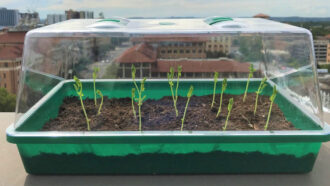 Agriculture
AgricultureDew collector brings water to thirsty plants
This invention grabs water from the air at night. All it needs is the sun’s warmth the next day to release that moisture to growing plants.
-
 Tech
TechBye-bye batteries? Power a phone with fabric or a beacon with sound
New piezoelectric systems produce electricity in unusual ways, such as when a certain nylon bends or underwater ceramics vibrate.
-
 Chemistry
ChemistryA soil-based ‘concrete’ could make buildings green, even on Mars
A new soil-based material offers an alternative to concrete for 3-D printing environmentally friendly buildings.
-
 Tech
TechFlexible devices may help clothes solar power your screens
A fluorescent polymer duo boosts the efficiency of solar cells. One day this material may coat your jacket, hat or backpack to provide power on the go.
By Shi En Kim -
 Chemistry
ChemistryHere’s how to make flip-flops biodegradable
Innovative flip-flops made from an algae-based plastic decompose in soil or compost. The comfy shoes also avoid use of fossil fuels.
-
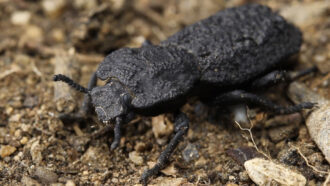 Animals
AnimalsThe diabolical ironclad beetle is nearly unsquishable
The diabolical ironclad beetle is an incredibly tough little creature. A peek inside its exoskeleton reveals what makes it virtually uncrushable.
-
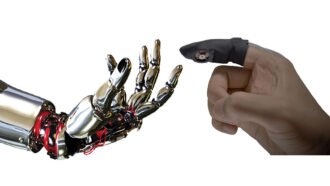 Tech
TechThis artificial skin feels ‘ghosts’ — things you wish were there
Engineers have developed a wearable device that simulates the sense of touch. It may benefit robotic surgery and deep-sea exploration.
-
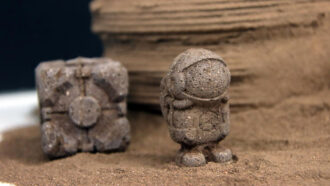 Materials Science
Materials ScienceAnalyze This: Insect shells could help builders on Mars
When mixed with rocky soil, a compound called chitin makes a strong material. It could be pulled from the shells of insects used for food.
-
 Tech
Tech‘Frozen smoke’ could protect electronics from annoying static
A fluffy material made from cellulose nanofibers and silver nanowires can protect electronic devices by blocking more than 99.99 percent of disrupting interference, a new study reveals.
By Sid Perkins -
 Climate
ClimateLet’s learn about solar power
Solar power is a way to harness energy from the sun, and lessen our reliance on fossil fuels.
-
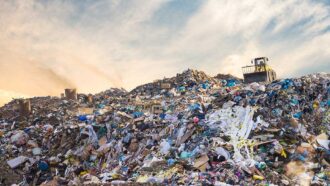 Chemistry
ChemistryHow to recycle ‘nonrecyclable’ plastics
A new process can convert some nonrecyclable plastics into a type that now can be reused. That could greatly cut down on wastes sent to landfills.